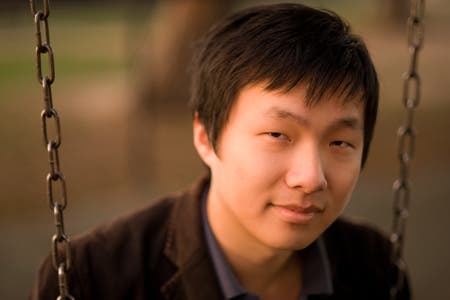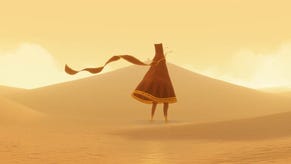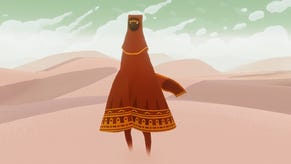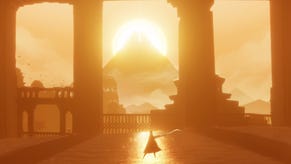Jenova Chen: Journeyman
From the archive: Journey's creative director on his quest to become the best gamemaker in the world.
Just over three years since it was first released, and having become one of the critical darlings of the last generation, Journey is being re-released for PS4. Digital Foundry will be looking at the technical upgrade the game's received, and in the meantime here's Simon Parkin's profile of Journey's director, Jenova Chen, originally published in April 2012.
"There's this quotation from St Augustine..."
Jenova Chen puts down his hamburger and fixes me with a warm but firm stare. Trust the designer of Flower and Journey to invoke a 3rd century theologian as an entry point to the subject of online tea-bagging. "Augustine wrote: 'People will venture out to the height of the mountain to seek for wonder. They will stand and stare at the width of the ocean to be filled with wonder. But they will pass one another in the street and feel nothing. Yet every individual is a miracle. How strange that nobody sees the wonder in one another.'"
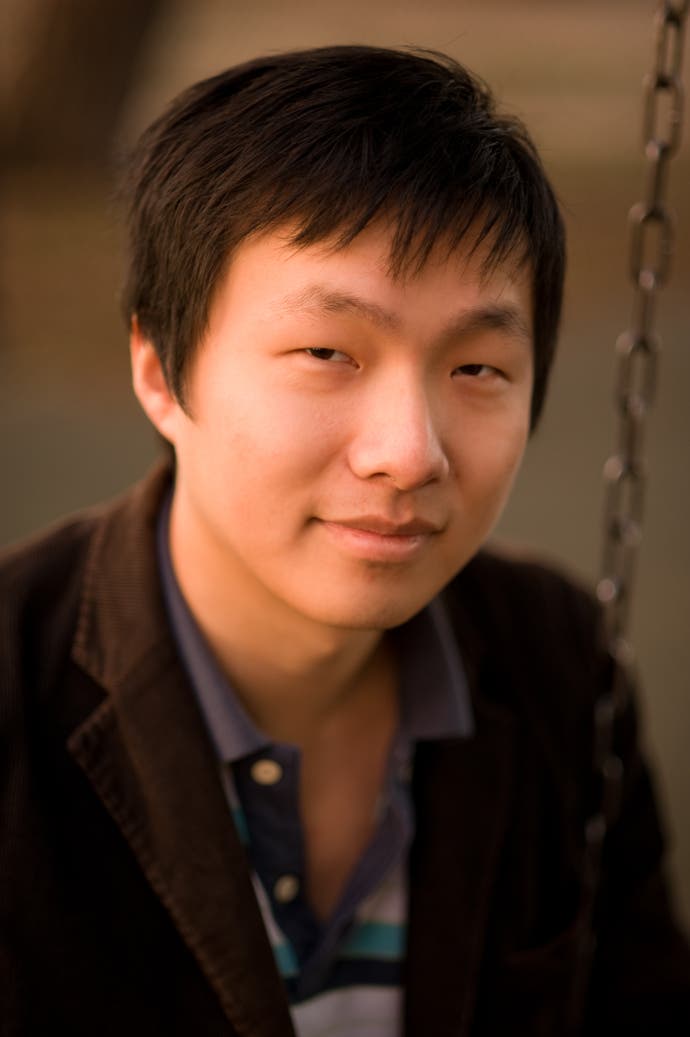
Chen takes a quick breath. "There's this assumption in video games that if you run into a random player online, it's going to be a bad experience," he continues. "You think that they will be an asshole, right?"
I nod, still thinking about Augustine and the sense of wonder I've felt since first sitting down to talk to this studious Chinese game developer.
"But listen: none of us was born to be an asshole," he says. "I believe that very often it's not really the player that's an asshole. It's the game designer that made them an asshole. If you spend every day killing one another how are you going to be a nice guy? All console games are about killing each other, or killing one another together... Don't you see? It's our games that make us assholes."
Chen and I meet for lunch a few days before the official release of his latest game, Journey, in a bustling café a couple of hundred metres from the Moscone Center in San Francisco. It's filled with loud bits of conversation, snatches of dialogue from people taking a food stop midway through the Game Developers Conference.
Chen speaks with the manner of a computer science nerd; quietly thoughtful in a way that some might take to be nervously arrogant. But his words are that of the exuberant preacher, a humanist sermon to a congregation of one delivered as a call to action for game designers to create better systems in order that they might create a better online world.
Not for the first time during out lunchtime discussion, I touch my arm and feel goosebumps. Chen, as a music journalist from the 1960s might say, has soul. But where did this heart come from? What journey led the designer here?
The Call To Adventure
At the age of 14, perched on the edge of his bed in a tiny apartment in Shanghai Jenova Chen put down the controller and cried.
"My parents were incredibly strict about what I was allowed to read or watch," he tells me. "I had limited access to novels, television or movies so this game was the first piece of media that moved me to tears. It was my first cry and it was so deep and strong. It was like nothing I had ever experienced before."
The Legend of Sword and Fairy is the equivalent of Final Fantasy 7 in the Chinese RPG history. Its story of love and loss deeply affected a generation of Chinese. "Looking back today I find the game shallow and clichéd," he says. "But it was the first impact a medium made on me in this way, and I fell in love."
Through those tears Chen found catharsis (a term he returns to time and time again during our conversation) and, when they had dried, he felt a peace in which he began to question his existence. "I found myself asking: what kind of life do I want to live? What is good? What is bad? Why am I here? Afterwards I felt like a better person."
"Then I began looking to the future and I decided that I wanted to dedicate my life to helping others experience what I had just felt. I didn't know it was gong to be through games at that time, but I knew it was going to be through something."
For the first 22 years of his life, Jenova Chen didn't leave Shanghai.
His was a childhood defined by boundaries: physical, social and parental. The city's over-crowding confined his family to a small apartment. China's one-child policy ensured he had no siblings, while the country's lack of state or company run retirement plans placed full responsibility for his parents' pension on his shoulders.
The burden to succeed at school in order to earn a good salary was immense. For Chen, a gifted and talented young student placed in a class of high achievers, this pressure was heightened yet further still. "It's a cruel system," he tells me. "Every semester the last three kids in the class are kicked out. I was in this elite class so if you were kicked out you dropped to a 'normal' class and people would call you a loser."
Boundaries, competition, leaderboards: all societal systems that Chen grew up with and that are also prevalent in most videogames. And yet, they are curiously absent from his creations. I ask him if the pressure of growing up within these physical and psychological confines is what has drove him away from competitive, task-based games. After all, Flower is set in the countryside, its chapters interspersed by short cut-scenes showing a wilting flower in an urban apartment, perhaps dreaming of freedom from Shanghai, while his latest creation, Journey, is a game with the capacity for multiplayer competition wholly removed.
Until now, Chen has spoken in gentle voice, pausing to compose each response, occasionally reflecting inquiries back at me. But at this question he becomes visibly irritated. "I am a competitor," he says. "I play and love competitive games. You know, I was champion at a fighting game in high school. I was a StarCraft champion in college. I still play DOTA. I love to win. I love to win. When it comes to making games it's not like I love peaceful games. I make this kind of game because I want to win as well. To me the measure of a human's greatness is the value they can contribute to society. The game industry doesn't need another shooter; it needs something to inspire them."
I ask if his competitive streak means he wants to 'win' at game design, and if he's exploring a less explored area of game design in order to increase the chances of this.
"Right," he replies, smiling. "It has nothing to do with me hating the education system. I survived the education system."
The Road Of Trials
The Buffalo Grill. That's where we're eating and it's by design. Chen tells me this is the place he first ate at on his first trip to GDC, eight years ago and that's why he's brought me here. Following his life-changing experience with The Legend of Sword and Fairy at 14, he decided he wanted to become an animation director, making films in the style of Studio Ghibli.
But during college some of his friends decided to make a game and roped Chen in to create the assets and animation. "In the end we made three games," he says. "They were all clones, of course, but good ones! One was a Diablo clone and another was a fully 3D Zelda, like The Wind Waker."
"Ambitious," I say.
"I know, but we totally pulled it off." When he graduated from college Chen won a place at the University of Southern California to study film, and he largely forgot his experiences making games. But when his lecturers discovered his ability to code (the computer science shtick is no accident - he studied the subject during college) he was enrolled in the film school's game program.
Rather than fighting against the decision, Chen embraced it, the competitive side of his persona realising that games offered him an arena in which to potentially make a greater impact than Hollywood.
"Film is very established; you have a genre for every single thing you want to feel," he says. "No matter your age, genre, nationality and mood there's something for you. But for games... You have a thriller, horror, action film, and sports victory film. But there is no romance, no drama, no documentary, and no thoughtful examination on life. These are basic feelings humans want to have in life, but they are just not available in games. That's why lots of people stop playing games as they grow older; they want to feel these things but games don't offer it."
It's Chen's view that most video games only cater to the kind of experience that young people are interested in, and the rhythms of learning and mastery that come later in a human's life are relatively untouched.
"Games are, in essence, tools for us to learn something," he explains. "When we were kids playing in the playground we are really learning about our own bodies, and discovering basic social dynamics with other kids. But as you grow older and become a teenager you move to games like basketball and soccer. You learn teamwork. But you rarely see people over 35 still playing these games. That's because they already learned and mastered those skills. You look at older people and they play Poker. Poker is a game about deception, calculation and manipulation; they are useful skills to master later in life. Golf is another example. Golf isn't really about the game so much as the social connections. And the interaction and stimulation you get from playing with someone."
"I believe that there are only three ways to create valuable games for adults. You can do it intellectually, whereby the work reveals a new perspective about the world that you have not seen before. The closest thing I can see to this is Portal. The second way is emotionally: touching someone. You can touch kids emotionally very easily, but it's far harder to touch adults because they are so jaded.
"The only way you can touch an adult is by creating something especially relevant to their lives, or by creating something that is so authentic that it becomes empowering. In order to reach those heights you have to reach catharsis. So that after the strong emotion the adult can begin to reflect on his own, start to find meaning in his own life. That's how I can see I can make games for people around me. The third and final way is by creating a social environment where the intellectual or emotional stimulation could happen from other people. Those are the only three ways."
So Chen began to study game design at film school and, one spring, USC sent him to GDC. "At that time I just presumed every American kid was a coding genius like John Carmack," he laughs.
"But I came to the IGF booth to check out the student games and I was like: 'These games are crap!' Like, the games I made in college were way better than any of these things. I was with my friend and I turned to him and said: 'Let's make a game. We can do better than this.'"
When Chen and his friend returned to USC they began working on a game called Cloud, a flight game that he revealingly dubbed 'a childhood dream simulator'. All children dream of flying away, but for Chen, defined by boundaries, the longing was perhaps stronger than most. The pair released the game onto the web as a free download and it wasn't long before Chen began to receive emails about his creation.
"I had messages from people in Japan saying they had cried while playing. Someone even told me I was a beautiful person for making this game. My entire life and nobody told me I was a beautiful person. So I sat back and wondered: what went right? What's the difference between this game and the others? The only difference I could think of was that the game makes you feel differently. In that moment I realised this was my life calling. Rather than being a film or animation director I could change what people see games as. I'd go as far as to say I feel like I have a responsibility to do it."
The Vision Quest
In 2006, two years after Chen had first been underwhelmed by the IGF entrants, his game Cloud won the Student Showcase competition at the same event. Despite this, the designer is critical of his creation, saying it's a bad game because the controls are "unintuitive". I ask him what, if that is the case, exactly resonated with players to bring the game so much attention. "I think it's the innocence and the loneliness and the feeling of being free yet melancholy at the same time," he replies.
Isolation and detachment is certainly a theme to Chen's work to date. I wonder why he is attracted to that?
"I guess because we are creators, we tend to be lonely most of the time," he says. "There's a desire to be connected as artists. We want to feel understood, and that our voice has been heard. The fact I received 500 emails with Flower... I felt like I said something and someone heard it. And because we are mostly lonely as human beings the desire to be accepted by others is so strong. When people experience a shared sense of loneliness their immediate reaction is to reach out and make contact. I would imagine anyone who is creating something is searching for connection."
He looks directly at me: "For you as a journalist, you are looking for somebody to hear your voice, aren't you?" I take a bite of my hamburger.
This sense of experiencing a shared sense of loneliness is at the heart of Chen's latest game, PSN download title Journey, a game that sits precisely within the designer's vision for creating games that create space for new kinds of emotional experiences.
But with a three year development (a year over schedule) for a two to three hour game, it was a far from straightforward project, and one in which the elusive emotions Chen was seeking to elicit were tough to summon. "Journey used to be a four-player game," he reveals. "And four player games offer many more social dynamics. It's a lot more interesting. But I was obsessed with creating a unique connection between two people, and so I found that having two extra people in the mix hurt that connection. It's much harder to create a meaningful four player game than a two player one."
"The reason we wanted to create Journey besides reaching that cathartic moment in the end was to create a real connection between two people. The reason I do that is because most people are saying right now: social gaming is hot. But no other game is really socialising, as in the emotional exchange between two humans. In almost all games the only exchange between two players is bullets or numbers. On Facebook it's more numbers, on PC and consoles it's more bullets.
"So I wanted to see as a designer whether I could create an emotional exchange. Originally we created all of the typical co-op mechanics. Saving one another, healing, opening a door together, you know: 'You step on here, I step on here and something opens..." And I realised that those are all still mechanical exchanges. To really exchange feelings you need to prepare players to be ready to exchange emotional feelings."
"There's this assumption in video games that if you run into a random player over the Internet, it's going to be a bad experience. You think that they will be an asshole, right? But listen: none of us was born to be an asshole. I believe that very often it's not really the player that's an asshole. It's the game designer that made them an asshole."
Chen looks around and motions in the direction of the GDC convention centre.
"I'll explain," he says. "When I'm walking in the convention centre I am thinking about where I need to be and at what time. I am in task solving mode. I am not interested in socialising. This is exactly how it is in most video games. The vast majority of multiplayer experiences are about task solving. But if players are in task solving mode they are not in the right frame of mind to exchange emotional connections. So to prepare them we had to remove everything about tasks: all quests had to go from Journey, all puzzles. And so then, it's more likely the player will be ready to engage in social contact."
He pauses. "Then we worked to make you feel lonely. In that mental state players begin to have a longing to connect or to get close to something or somebody like them. So that's what we did. We removed everything in order to have an environment where people can exchange emotion."
I point out that, with this lack of mechanic, Chen appears to be trying to replicate a social interaction that might occur in real-life. But while that's an interesting experiment, it doesn't necessarily say anything or speak to anything wider. Was he trying to make a point?
"There is this quotation from St Augustine."
Jenova Chen puts down his hamburger and fixes me with a warm but firm stare.
"Augustine wrote: 'People will venture out to the height of the mountain to seek for wonder. They will stand and stare at the width of the ocean to be filled with wonder. But they will pass one another in the street and feel nothing. Yet every individual is a miracle. How strange that nobody sees the wonder in one another.'
"There's this assumption in video games that if you run into a random player over the Internet, it's going to be a bad experience. You think that they will be an asshole, right? But listen: none of us was born to be an asshole. I believe that very often it's not really the player that's an asshole. It's the game designer that made them an asshole. If you spend every day killing one another how are you going to be a nice guy? All console games are about killing each other, or killing one another together... Our games make us assholes."
"Or about turning other players into a resource, used to open doors and so on?" I interject.
"Right," he says. "It is the system that made the player cruel, not the player themselves. So if I get the system correct, the players are human and their humanity will be drawn out. I want to bring the human value into a game and change the player's assumption."
Chen reaches into his pocket to pull out his iPhone. "I want to show you something," he says.
"Last night Journey was made available to PlayStation Plus subscribers. A few hours later some players started a thread on the game's forum called 'Journey Apologise Thread'."
"What's that?" I ask.
"Read for yourself," he says, handing me the phone.
It's a list of players thanking and apologising to the anonymous players they encountered on their journey through the game.
- I am so grateful for your assistance tonight. You were so patient when my flying skills didn't add up.
- I'm really sorry I hid behind the rock and had a panic attack when that thing first came at us. It kinda caught me off guard.
- To my friend in the fifth area. I never wanted to leave you. I just whiffed really badly on a jump. I miss you. And I'm sorry.
- To everyone I played with: thank you for never leaving me.
As I read through the list, Chen smiles at me.
"I have goosebumps," I say.
The Meeting with the Goddess
There's a short lull in the conversation as we both work to clear our plates a little. The food has grown cold.
After a while Chen begins speaking again: "There was a point in Journey's development when I hated myself."
"Why was that?" I ask, looking up.
"We made a prototype where players could help one another to accomplish tasks. One of the developers suggested that it might be fun to introduce a wind so strong that players could only pass it by pushing one another. At that point we didn't have any collision detection so we added collision to create the mechanic. But you know what happened? When the team could push each other around in the game all they would do is try to push one another into the deadly pits. Even though we all knew this game was to be about positive things about humanity, everyone just wanted to kill one another. I couldn't resist the urge to do that myself. So for a period of time I was so sad and disappointed in my teammates and myself."
"Then I ran into this child psychologist I told her about the dilemma in the game. And she said to me: 'Oh, your players are just becoming kids again'."
"What did she mean?" I ask.
"I asked the same thing. And she said: 'when kids are born they have no moral values. They don't know what's good or bad. So they seek out actions that give them the strongest feedback."
"I don't understand," I say.
Chen begins banging on the table with his fork. A couple on the table next to us turn their heads, unsure of whether to be concerned or irritated.
"A baby does this, right?" he says. "And you tell them to stop, but instead of stopping they do it louder still. To the baby this action is giving them strong feedback and attention. And this psychologist told me that this is like when players enter a virtual world for the first time. They are like babies. They don't know the rules so they perform actions that give them the strongest feedback. She said: 'the best way to stop a baby from doing something you don't want them to is by giving them no feedback.'"
"The thing is, everyone is seeking for maximum feedback. If you push someone in the pit then the feedback is huge: the other guy dies, there's animation, sound, social tension and the opportunity to revive her. These things combine together make pushing another player into a pit much more satisfying than just pushing somebody into the wind."
"I see," I say. Chen stops banging on the table. The couple return to their hamburgers. "So what happened when you removed collision detection?"
"Players started looking for other ways to get more feedback. Helping each other yielded the most feedback so they began to do that instead. It was fascinating."
The Hero's Journey
Our time is almost up. While the joy of GDC is the lack of PR people to chaperone designers, allowing for free and unfettered conversations like ours today, natural deadlines are set by the need to attend sessions, take meetings and so on. We clear our trays and begin to meander back to the convention centre. But I am still intrigued by Chen's comparison of games to films, a traditionally unpopular association for game designers such as him. Does he think the ties are so close? Perhaps there are some subjects that video games are ill equipped to tackle, or some emotions that video games are unable to elicit.
"No. Gaming is the medium that can combine all facets of film with interactive design," he says, firmly. "To all intents and purposes, games should be more capable than film. But the fact is that gaming is still a subset of the film industry. It's tragic. I see so much potential. I feel like there is so much more I can do here."
That competitive side of Chen's psyche flares up again.
"So what we try to do is spearhead emotional content. If the entire game industry is focusing on excitement and adrenaline rushes... well, then I will look at peace, or love. That way we can expand the perception of what games can be and can accomplish. That's why I make games. That's why I am on this journey."
